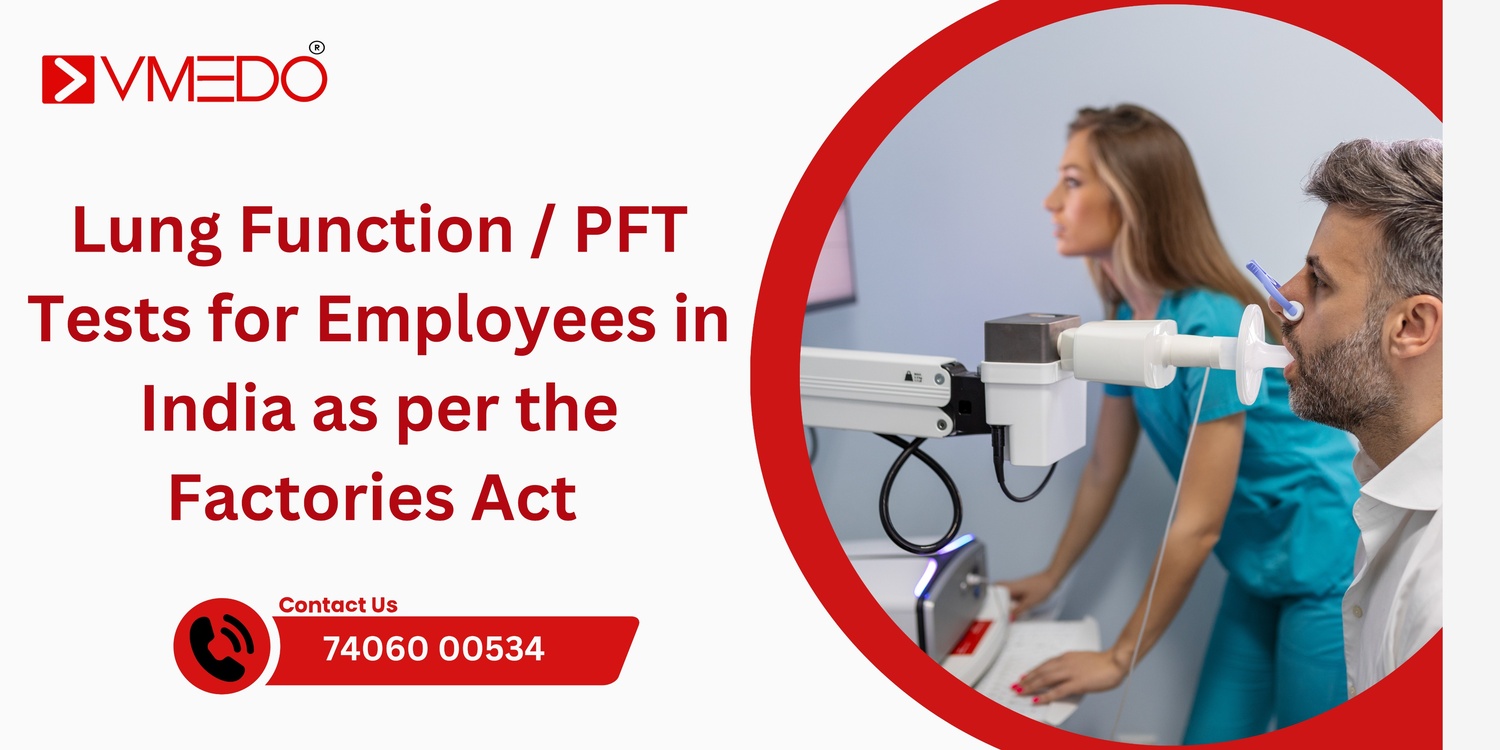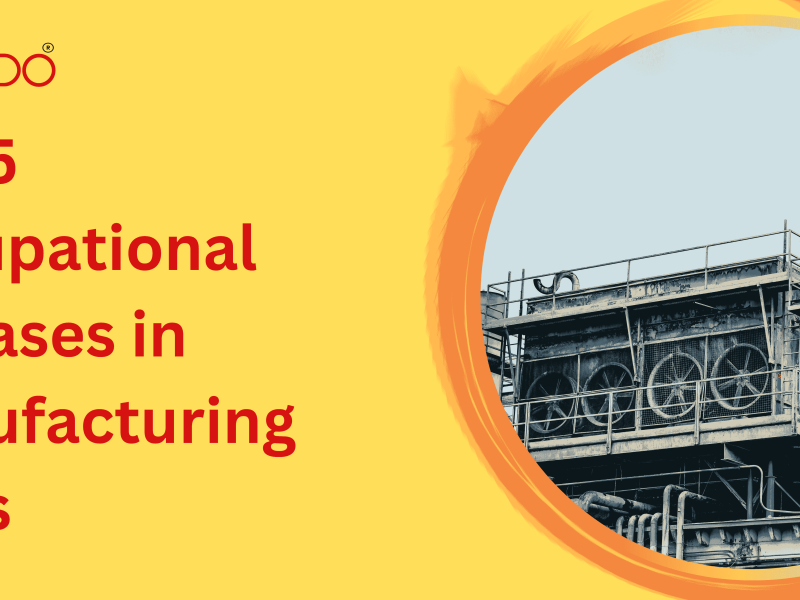-
What happens if an employee’s PFT results show abnormalities?
If PFT results indicate potential lung issues, healthcare providers may refer employees for further evaluation, including imaging tests like chest X-rays or CT scans. Based on the diagnosis, doctors may recommend treatment options or advise modifying the work environment to minimize exposure to harmful substances.
-
Is there any preparation needed before taking a PFT?
Yes, employees should follow these general guidelines before a PFT:
- Avoid eating a large meal 1-2 hours before the test.
- Refrain from heavy exercise right before the test.
- Avoid smoking for several hours before the test.
- Employees with respiratory conditions should consult with their doctor about medication usage before the test.
-
Cities VMEDO operates?
Bangalore, Chennai, Hyderabad, Mumbai, Kolkata, Pune, Ahmedabad, Delhi, Kochi.
Lung health is an essential aspect of overall employee well-being, especially for individuals working in industries where exposure to pollutants, chemicals, or dust is common. In such workplaces, regular monitoring of lung function becomes crucial. One of the primary methods for assessing lung health is through a Pulmonary Function Test (PFT), which provides valuable insights into an individual’s respiratory health.
For employers aiming to simplify lung function testing and ensure regulatory compliance, VMEDO offers a seamless solution with our occupational health services. Our offerings include convenient access to Pulmonary Function Tests (PFTs), comprehensive health checkups, and digital health tracking to keep your workforce safe and healthy.
VMEDO’s expert team provides end-to-end occupational health solutions to safeguard your team’s well-being and meet compliance requirements. For customized lung health services, reach out to us at +91-74060 00534 today.
What is a Pulmonary Function Test (PFT)?
PFTs are a set of non-invasive tests that assess lung capacity, volume, and efficiency. They provide vital information about how well the lungs are functioning and help detect conditions like asthma, COPD, and other respiratory issues. These tests include:
- Spirometry: Measures how much air one can inhale and exhale and the speed of exhalation.
- Lung Volume Test: Assesses the amount of air in the lungs after a full inhale and exhale.
- Gas Diffusion Test: Checks how well oxygen passes from the lungs to the bloodstream.
Why is PFT Important for Employees?
- Detect respiratory issues early, preventing further complications.
- Protect employees from chronic respiratory diseases.
- Ensure a safe working environment in compliance with health and safety regulations.
Legal Requirements in India for Employee Health Checks
The Factories Act of 1948 mandates that industries with hazardous substances should have regular health assessments, including PFT, for employees exposed to respiratory risks. PFTs are part of occupational health protocols to ensure compliance and maintain workplace safety standards.
How are Pulmonary Function Tests (PFTs) Conducted?
PFTs typically consist of several tests that together assess the lung’s ability to take in air, move it through the airways, and exchange gases. Here are the most common types of PFTs:
1. Spirometry
Spirometry is the most common type of pulmonary function test. It measures how much air a person can breathe in and out, and how fast they can blow air out. This test is used to assess conditions like asthma, COPD, and pulmonary fibrosis. The procedure involves:
- Taking a deep breath.
- Blowing out the air as fast and hard as possible into a spirometer device.
- Repeating the test several times to ensure accurate results.
Key spirometry measures include:
- Forced Vital Capacity (FVC): The total amount of air you can exhale after taking a deep breath.
- Forced Expiratory Volume (FEV1): The amount of air you can exhale in one second.
- FEV1/FVC ratio: The ratio helps diagnose whether someone has obstructive or restrictive lung disease.
2. Lung Volume Measurement
This test measures the total amount of air the lungs can hold. It can help diagnose restrictive lung diseases, where the lung’s ability to expand is reduced. The most common method used for lung volume measurement is the plethysmography test, which involves breathing into a machine inside a sealed chamber.
3. Diffusing Capacity of the Lungs (DLCO)
This test measures how efficiently gases like oxygen move from the lungs into the bloodstream. It helps in diagnosing conditions like pulmonary fibrosis or emphysema, which affect the lung tissue and gas exchange.
4. Body Plethysmography
This test measures the total volume of air in the lungs, including the air that cannot be exhaled. It helps diagnose restrictive lung diseases.
5. Peak Flow Measurement
This involves measuring the maximum speed of expiration, which helps assess the condition of the airways. It’s often used to monitor asthma patients’ condition.
Pre-Employment and Periodic PFT Screening in India
To safeguard employees’ lung health, many organizations in India conduct pre-employment screenings followed by periodic lung function tests. These tests are essential in both hazardous and non-hazardous work environments to:
- Assess pre-existing conditions: Pre-employment PFTs can identify potential lung problems before hiring an individual, ensuring that employees are fit for their roles.
- Monitor lung function over time: Periodic screenings help detect any deterioration in lung health, particularly for employees working in environments with high exposure to airborne hazards.
- Maintain regulatory compliance: In high-risk industries, periodic medical surveillance, including lung function tests, is required by law to ensure that employees are not exposed to unsafe working conditions.
PFTs in Occupational Health Guidelines in India
The National Safety Council of India (NSC) and other regulatory bodies advocate for periodic health checkups, including lung function tests, for workers in high-risk sectors. These guidelines are aimed at ensuring worker health and safety and are aligned with global best practices. Compliance with these guidelines not only promotes a healthy workforce but also safeguards businesses from potential legal and financial repercussions.
Which companies should do Lung Function / PFT Tests for Employees?
Lung Function or Pulmonary Function Tests (PFTs) are important for employees in industries where there is exposure to respiratory hazards. Companies in the following sectors should conduct these tests:
- Construction: Employees exposed to dust, asbestos, or fumes.
- Mining: Workers in underground or open-pit mining are exposed to dust, gases, and other pollutants.
- Manufacturing: Factories where employees are exposed to chemicals, vapors, or particulate matter.
- Chemical & Petrochemical: Employees handling chemicals, gases, or fumes that can affect lung health.
- Agriculture: Workers exposed to pesticides, fertilizers, or animal dust.
- Textile & Carpets: Workers exposed to cotton dust or other particulate matter.
- Steel & Foundries: Employees are exposed to fumes, smoke, and airborne particulate matter.
- Firefighting & Emergency Services: Exposure to smoke and chemicals during fire response.
- Shipping & Docking: Workers exposed to air pollution, cargo dust, or fumes.
These tests help monitor lung health and prevent occupational diseases like asthma, chronic obstructive pulmonary disease (COPD), or silicosis.
Why Choose VMEDO for Lung Function Testing?
VMEDO provides comprehensive occupational health services, including PFTs, with experienced professionals and state-of-the-art technology. We support organizations in maintaining employee health and legal compliance.
For tailored lung health services for your workplace, reach out to us at +91-74060 00534
VMEDO Services
- Annual Health Checkups for Employees (Factories Act Compliance) in India
- Pre-Employment Health Checkups in India
- Lung Function/PFT Tests for Employees in India
- Blood Tests for Employees (Factories Act Compliance) in India
- ECG Tests for Employees in India
- Audiometry Tests for Employees in India
- Eye/Vision Tests for Employees in India
- Medical Fitness Certificates (Factories Act Compliance)in India
- HIV/HBs Tests for Employees in India
- Chest X-Rays for Employees in India
- Hepatitis B Vaccinations in India
- HPV Vaccinations in India
- Tetanus (TT) Vaccinations in India
Frequently Asked Questions (FAQ) on Lung Function Tests for Employees in India
-
What is a Pulmonary Function Test (PFT)?
A Pulmonary Function Test (PFT) is a non-invasive test that measures lung capacity, airflow, and efficiency. It helps detect respiratory issues like asthma, COPD, and other lung diseases, ensuring early intervention for employees exposed to respiratory hazards.
-
Why are PFTs important for employees?
PFTs help detect respiratory issues early, especially in workplaces where employees face dust, fumes, and other airborne pollutants. Regular PFTs protect employee health, reduce absences due to illness, and ensure compliance with workplace safety standards.
-
How often should employees undergo a PFT?
For employees in high-risk industries, annual or bi-annual PFTs are recommended. A baseline test for new employees helps track lung health over time and detect any potential changes due to work conditions.
-
Are lung function tests mandatory in India?
5. How are PFTs conducted in the workplace?
-
- Spirometry: Measures the volume of air you can inhale and exhale, and how fast you can exhale.
- Lung volume measurement: Measures the total air capacity of the lungs.
- Diffusing capacity: Assesses how well oxygen moves from your lungs to the bloodstream.
- Peak flow measurement: Measures how fast you can exhale, commonly used for asthma management.
- Body plethysmography: Measures the total volume of air in the lungs, including air that cannot be exhaled.
These tests are non-invasive, typically completed within 30 minutes to an hour, and provide crucial data about lung health.
-
How accurate are PFT results?
PFT results are highly accurate when performed correctly, and the employee follows instructions, such as taking a deep breath and exhaling forcefully. However, factors like age, smoking history, and respiratory conditions can influence results, so a trained healthcare professional should interpret them.
-
What happens if an employee’s PFT results show abnormalities?
If PFT results indicate potential lung issues, healthcare providers may refer employees for further evaluation, including imaging tests like chest X-rays or CT scans. Based on the diagnosis, doctors may recommend treatment options or advise modifying the work environment to minimize exposure to harmful substances.
-
Is there any preparation needed before taking a PFT?
Yes, employees should follow these general guidelines before a PFT:
- Avoid eating a large meal 1-2 hours before the test.
- Refrain from heavy exercise right before the test.
- Avoid smoking for several hours before the test.
- Employees with respiratory conditions should consult with their doctor about medication usage before the test.
-
Cities VMEDO operates?
Bangalore, Chennai, Hyderabad, Mumbai, Kolkata, Pune, Ahmedabad, Delhi, Kochi.



